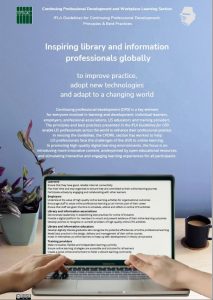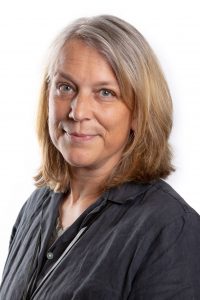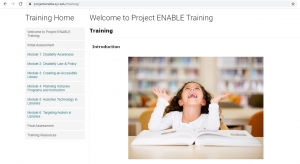On March 10, 2020, I attended the virtual conference Library 2.020: Wholehearted Libraries: Soft Skills for 21st Century Information Professionals. I previously described my take aways from the opening keynote session of the conference. This blog post addresses some of my takeaways from other sessions I attended at the conference.
The recordings for the keynote and regular sessions are all posted on the main event page for Library 2.0: https://www.library20.com/wholehearted. Please note that you need to be a member of Library 2.0 (free) to view them. If you aren’t a member, just click “Join” on the top right of the homepage. You can then view all of the presentation recordings for free.
Here are my takeaways…
***
Library Leaders Are Failing Librarianship: Soft Skills Needed for Human Library Leadership
Steven Bell, Associate University Librarian, Temple University Libraries
I attended an excellent session by Steven Bell focused on “Library Leaders Are Failing Librarianship: Soft Skills Needed for Human Library Leadership.” He identified common library leadership concerns including that staff are disengaged, staff have low morale, and staff lack confidence and trust in their leaders. For more on Low Morale Among Academic Librarians, see the research conducted by Kaetrena Davis Kendrick. He also mentioned a related article he wrote: How about a little kindness for library leaders? Leading from the Library.
Bell recommended that library leaders focus on three areas of human leadership. Human leadership means:
- creating a culture of change readiness,
- adopting new power (open, participatory, peer-driven) vs. old power (exercise new power), and
- establishing a self-aware empathic approach which means understanding workplace issues from the perspective of workers.
Bell identified 5 soft skills for human leaders:
- Engage in focused listening, e.g., talk less and listen more.
- Give meaningful feedback, e.g., give positive and negative feedback and engage in two-way feedback.
- Help others grow, e.g., nurture others and support their growth.
- Be flexible.
- Practice balanced leadership.
For next steps in human leadership, Bell recommended the following:
- Commit to being a human leader
- Commit to being a learning leader
- Commit to being a reflective leader
- Start with a small change, e.g., focus on more listening and less talking.
For additional reading, see Daring Leadership: What Library Leaders Can Learn from Brene Brown and SmartBrief Leadership.
***
Wholehearted Hypergrowth: Scaling Up in Silicon Valley
Elizabeth Borghi, Knowledge Program Manager, Knowledge Bee Knowledge Management Consulting
Before making the transition into knowledge manager roles in the Silicon Valley, Elizabeth Borghi started her career in public and academic libraries. Through her work in the Silicon Valley, Borghi learned the critical importance of soft skills and how, in fact, soft skills are key to team success.
She shared her experience of working at a rapidly growing startup company which had to scale its global employee hiring very quickly. She was asked to develop a 2-week-long training program for all new employees and to on board these new employees quickly.
Through this experience, Borghi identified the following as key elements of wholehearted workplaces:
- Empathy – for our customers and for one another; this should be part of everything we do.
- Curiosity and growth – through a supportive learning environment, which can provide job shadowing, mentorship, lending library, and exposure to new opportunities.
- Radical trust – support employees when mistakes happen; encourage failing forward. Make sure that employees know that you are there to help them succeed, and that you show up to work giving 100% to the job. It is also important that we give one another feedback.
Summing up her talk, she quoted Rumi:
“Wherever you stand be the soul of that place.” Rumi
***
Closing Keynote
Michael Stephens, Associate Professor in the School of Information at San Jose State University @mstephens7
Stacie Ledden, Director of Strategic Partnerships at Anythink Libraries @ilovemyanythink
Dr. Michael Stephens kicked off the closing keynote by asking Library 2.0 conference attendees to reflect on 3 AHAs that amazed you, 2 concepts you want to focus on, and 1 idea to apply immediately. A couple of AHAs participants shared were that we have to serve ourselves, libraries are central to meeting basic needs, a strong library = a strong community, and kindness is important. A couple of concepts participants wanted to focus on included self-care and developing more empathy. One idea that a participant wanted to apply immediately was being more kind to myself.
Dr. Michael Stephens then interviewed Stacie Ledden about Anythink Libraries and her views about wholehearted libraries.
- Q: What does it mean to you to be a wholehearted library?
A: It means putting people at the center and helping people fall in love with libraries. Anythink is a values-based organization focused on: Compassion, Eagerness, Passion, Everyone is creative, and Optimistic attitude.
- Q: What skills do you look for in Anythinkers?
A: As a competency-based organization, Anythink hires and reviews people based on their 13 core competencies, which includes I am customer focused; I am flexible and embrace change; I am a problem solver; I am emotionally mature; among other competencies. Anythink Libraries believe that they can teach their staff skills but they need to hire for the soft skills and attitudes (in other words, the innate sense of a person) that they are looking for.
- Q: What can we do to increase empathy in staff?
A: She recommended looking outside ourselves and our industry for inspiration and looking in the community.
- Q: What do you do if you feel some of your staff may not have that level of empathy that is needed? Can we teach it? What happens to people who aren’t where they should be?
A: She suggested that solid mentorship can help.
- Q: What story do you want to tell as Anythink Libraries?
A: She likes to think of Anythink Libraries as “Town Square” – the library is the place where people come together and can have dialogues for civic engagement.
Dr. Michael Stephens then concluded the conference with a brief conference wrap up. He reviewed some of the themes that emerged from the conference, including the importance of the following: love and taking care of people, “hygge” or sense of community, kindness, compassionate service, and compassionate leadership.
“We are the heart of our communities, and that only works because of what the people who work in libraries give of themselves. The best make that emotional investment because they believe in the institution and the communities they serve.” Dr. Michael Stephens
In sum, the heart of library means that:
- We listen to our users
- We teach in every sense of the word
- We build community
- We let everyone in.
“Libraries encourage the heart, which means we should…lead from the heart, learn from the heart, and play from the heart.” Dr. Michael Stephens
***
If you enjoyed this Library 2.0 conference, you might also be interested in speaking at and/or attending other upcoming Library 2.020 virtual conferences (all 12-3pm Pacific Time):
- Small, Rural and Independent Libraries— Wednesday, June 17, 2020. This conference is being organized in partnership with Jim Lynch from TechSoup for Libraries, Kate Laughlin from the Association for Rural & Small Libraries, and the School of Information at San José State University.
- Sustainability in Libraries— Wednesday, October 14, 2020. This conference is being organized in partnership with Rebekkah Smith Aldrich, executive director, Mid-Hudson Library System (New York), and the School of Information at San José State University.
For answers to frequently asked questions about the Library 2.0 conference, go to: https://www.library20.com/page/miniconferencefaq.



